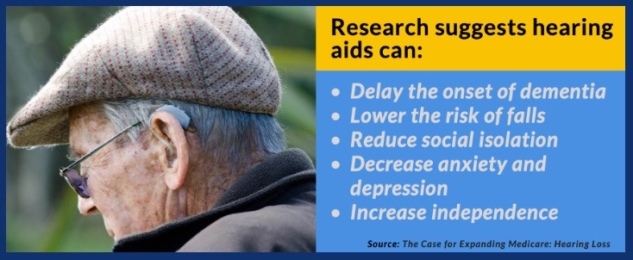Hearing Care
Hearing loss affects nearly half of adults over age 75. It can have a profound impact on physical and mental health to personal safety. For older adults, untreated hearing issues are linked to a higher risk of depression and social isolation. A recent study suggests that hearing aids can be a useful tool for improving mental health. Despite these risks and benefits, Medicare does not cover most hearing aids.
In this section, you’ll find articles, FAQs, and information on hearing aids and assistance programs at the state and national level. Plus, we offer tools to help you advocate for expanded coverage — and updates about over-the-counter hearing aids.
Let’s turn up the volume on hearing health—because everyone deserves to stay connected, safe, and engaged.
 Hearing Aid Resources
Hearing Aid Resources
Are you in need of hearing aid assistance? Explore the national and state resources available to you.
Frequently Asked Questions About Hearing Aids
Hearing aids are the most common treatment for hearing loss. Today’s hearing aids come in many styles, and offer features and technologies not available in years past.
State Telephone Programs
These are known as Telecommunications Equipment Distribution Programs (TEDPs). They provide free or low-cost telephone equipment to qualified individuals to accommodate their hearing loss and improve phone access.
Health Benefits of Hearing Aids
Increasingly, research is showing that hearing aids can do far more than just help you hear. They may also make you healthier. Here’s why.
October 19, 2021 – Status on Over-the-Counter (OTC) Hearing Aids
The FDA Reauthorization Act of 2017 (FDARA) details certain requirements to establish a category of over-the-counter (OTC) hearing aids and the kinds of regulatory requirements that will apply to them.
Over-the-counter hearing aids expected this fall in US
The regulation creates a new class of hearing aids that don’t require a medical exam, a prescription and other specialty evaluations.
New Research Suggests Hearing Aids Could Delay Dementia
A recent study suggests that hearing aids could be a useful tool for improving cognition and even delaying dementia.

Research suggests hearing aids can: Delay the onset of dementia, lower the risk of falls, reduce social isolation, decrease anxiety and depression, and increase independence.



 Hearing Aid Resources
Hearing Aid Resources